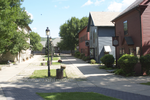Johnson School (North Adams, Massachusetts)
1896 establishments in MassachusettsBuildings and structures in North Adams, MassachusettsNational Register of Historic Places in Berkshire County, MassachusettsRomanesque Revival architecture in MassachusettsSchool buildings completed in 1896 ... and 2 more
School buildings on the National Register of Historic Places in MassachusettsSchools in Berkshire County, Massachusetts

The Johnson School is a historic former school building on School Street in North Adams, Massachusetts. Built about 1898, this Romanesque Revival school is a significant work of the prominent local architect Edwin Thayer Barlow. It was the last of the city's neighborhood schools to be closed. The building was added to the National Register of Historic Places in 1985. It is now used for Head Start and other social programs.
Excerpt from the Wikipedia article Johnson School (North Adams, Massachusetts) (License: CC BY-SA 3.0, Authors, Images).Johnson School (North Adams, Massachusetts)
Cady Street,
Geographical coordinates (GPS) Address Nearby Places Show on map
Geographical coordinates (GPS)
| Latitude | Longitude |
|---|---|
| N 42.705 ° | E -73.118888888889 ° |
Address
Cady Street 17
01247
Massachusetts, United States
Open on Google Maps








